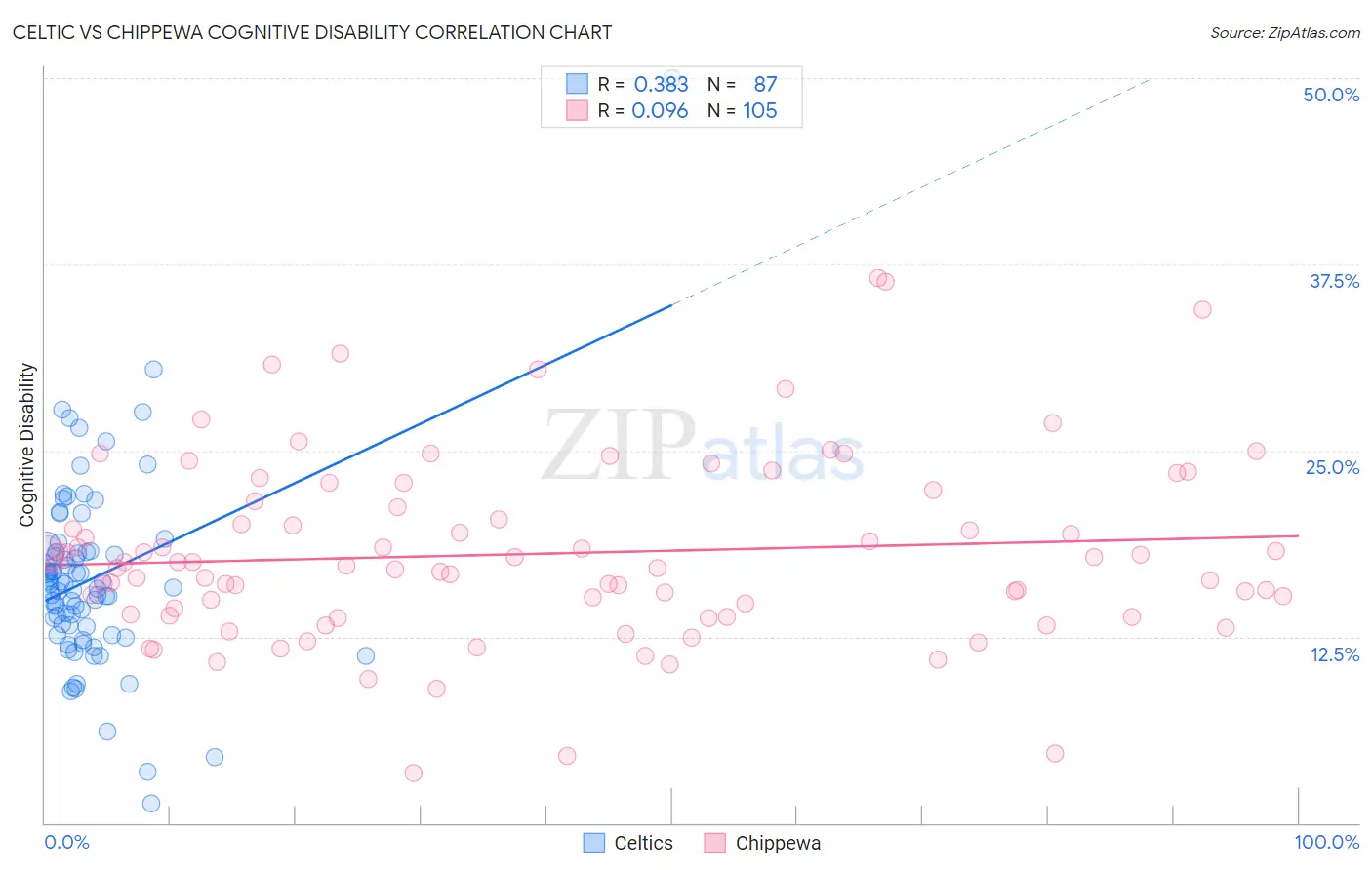Celtic vs Chippewa Cognitive Disability
COMPARE
Celtic
Chippewa
Cognitive Disability
Cognitive Disability Comparison
Celtics
Chippewa
17.1%
COGNITIVE DISABILITY
74.1/ 100
METRIC RATING
158th/ 347
METRIC RANK
18.1%
COGNITIVE DISABILITY
0.1/ 100
METRIC RATING
279th/ 347
METRIC RANK
Celtic vs Chippewa Cognitive Disability Correlation Chart
The statistical analysis conducted on geographies consisting of 168,858,493 people shows a mild positive correlation between the proportion of Celtics and percentage of population with cognitive disability in the United States with a correlation coefficient (R) of 0.383 and weighted average of 17.1%. Similarly, the statistical analysis conducted on geographies consisting of 215,049,109 people shows a slight positive correlation between the proportion of Chippewa and percentage of population with cognitive disability in the United States with a correlation coefficient (R) of 0.096 and weighted average of 18.1%, a difference of 5.4%.

Cognitive Disability Correlation Summary
| Measurement | Celtic | Chippewa |
| Minimum | 1.3% | 3.4% |
| Maximum | 50.0% | 36.6% |
| Range | 48.7% | 33.2% |
| Mean | 16.4% | 18.1% |
| Median | 15.8% | 17.3% |
| Interquartile 25% (IQ1) | 13.2% | 14.0% |
| Interquartile 75% (IQ3) | 18.2% | 21.4% |
| Interquartile Range (IQR) | 5.0% | 7.4% |
| Standard Deviation (Sample) | 6.4% | 6.1% |
| Standard Deviation (Population) | 6.3% | 6.1% |
Similar Demographics by Cognitive Disability
Demographics Similar to Celtics by Cognitive Disability
In terms of cognitive disability, the demographic groups most similar to Celtics are Immigrants from Latvia (17.2%, a difference of 0.030%), Australian (17.2%, a difference of 0.060%), Immigrants from Australia (17.1%, a difference of 0.070%), American (17.2%, a difference of 0.070%), and Yugoslavian (17.2%, a difference of 0.090%).
| Demographics | Rating | Rank | Cognitive Disability |
| Syrians | 83.0 /100 | #151 | Excellent 17.1% |
| Immigrants | Indonesia | 82.7 /100 | #152 | Excellent 17.1% |
| Immigrants | Kazakhstan | 80.5 /100 | #153 | Excellent 17.1% |
| Immigrants | Malaysia | 79.3 /100 | #154 | Good 17.1% |
| Brazilians | 78.9 /100 | #155 | Good 17.1% |
| Sri Lankans | 78.9 /100 | #156 | Good 17.1% |
| Immigrants | Australia | 76.0 /100 | #157 | Good 17.1% |
| Celtics | 74.1 /100 | #158 | Good 17.1% |
| Immigrants | Latvia | 73.2 /100 | #159 | Good 17.2% |
| Australians | 72.4 /100 | #160 | Good 17.2% |
| Americans | 72.2 /100 | #161 | Good 17.2% |
| Yugoslavians | 71.6 /100 | #162 | Good 17.2% |
| Immigrants | Switzerland | 71.5 /100 | #163 | Good 17.2% |
| Armenians | 70.1 /100 | #164 | Good 17.2% |
| Immigrants | Albania | 64.9 /100 | #165 | Good 17.2% |
Demographics Similar to Chippewa by Cognitive Disability
In terms of cognitive disability, the demographic groups most similar to Chippewa are West Indian (18.1%, a difference of 0.010%), Immigrants from Micronesia (18.1%, a difference of 0.050%), Yuman (18.1%, a difference of 0.060%), Immigrants from Kuwait (18.1%, a difference of 0.060%), and Immigrants from Laos (18.1%, a difference of 0.10%).
| Demographics | Rating | Rank | Cognitive Disability |
| Immigrants | Honduras | 0.2 /100 | #272 | Tragic 18.0% |
| Immigrants | Nepal | 0.2 /100 | #273 | Tragic 18.0% |
| Immigrants | Nigeria | 0.2 /100 | #274 | Tragic 18.0% |
| Immigrants | Laos | 0.2 /100 | #275 | Tragic 18.1% |
| Yuman | 0.2 /100 | #276 | Tragic 18.1% |
| Immigrants | Kuwait | 0.2 /100 | #277 | Tragic 18.1% |
| Immigrants | Micronesia | 0.2 /100 | #278 | Tragic 18.1% |
| Chippewa | 0.1 /100 | #279 | Tragic 18.1% |
| West Indians | 0.1 /100 | #280 | Tragic 18.1% |
| Yakama | 0.1 /100 | #281 | Tragic 18.1% |
| Immigrants | Cambodia | 0.1 /100 | #282 | Tragic 18.1% |
| Nigerians | 0.1 /100 | #283 | Tragic 18.1% |
| Immigrants | Uganda | 0.1 /100 | #284 | Tragic 18.1% |
| Bermudans | 0.1 /100 | #285 | Tragic 18.1% |
| Kenyans | 0.1 /100 | #286 | Tragic 18.1% |